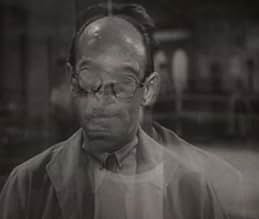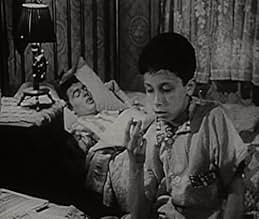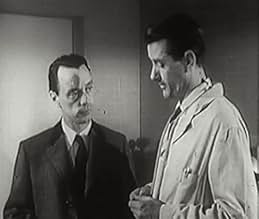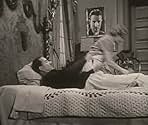Agrega una trama en tu idiomaDrama following the professional and personal lives of doctors and surgeons led by Dr. Konrad Styner. Pioneering in its unflinching depiction of medical procedures and operations.Drama following the professional and personal lives of doctors and surgeons led by Dr. Konrad Styner. Pioneering in its unflinching depiction of medical procedures and operations.Drama following the professional and personal lives of doctors and surgeons led by Dr. Konrad Styner. Pioneering in its unflinching depiction of medical procedures and operations.
- Ganó 2 premios Primetime Emmy
- 3 premios ganados y 12 nominaciones en total
Explorar episodios
Opiniones destacadas
I was 7 when this show started airing and could not wait to get home from school to watch it whenever it was on. I am watching reruns now on DECADES tv and am as in awe as I was way back then. This show was very much ahead of its time and I credit it with being the inspiration for my adult life spent in the medical field. We would not see the likes of this again until ER or Quincy. In re-watching in 2019, (and thank Heavens DVDs are now available with the episodes that can be found), I find the show still to be informative, instructive and one that dealt with hard issues, especially for the era - infertility, infant mortality, leprosy and its stigma even though it is known not to be communicable, euthanasia, etc. I was very surprised at the almost scholarly level of the episode about infertility - with reproduction explained in ways that most could understand without its being technical or raw. Richard Boone was amazing in his narration, and did appear in a few episodes. All these years later, I have held memory of the theme song - Blue Star - so beautiful. Also, the opening comments always give me chills: "Guardian of birth, healer of the sick, comforter of the aging; and the qualities of the worthy physician are three: the eye of an eagle, the heart of a lion, the hand of a woman." I gave this a 10, not only for my memory of it but it seeing the episodes all over again. Beautiful, informative show. It is a rare doctor who comes to the home any more but how wonderful those were who did.
James Moser was one of the outstanding writing talents in Television history. Sadly, he is almost forgotten and is, probably, quite unknown. He graduated from a Catholic college in California, then booked ship as a sailor on a tramp steamer headed to Australia. After working a variety of jobs in Australia, including journalism, he returned to the states and started writing for Radio. Jack Webb noticed his talent and hired him to be head writer on Dragnet. Moser wrote a wide range of teleplays in the fifties, including a dramatization of the life of Charles Proteus Steinmitz. Moser came up for the idea of an intelligent, realistic medical drama, that would star Richard Boone as Dr. Conrad Styner. To make sure the show was authentic, Moser worked as an orderly in a Los Angeles hospital for nearly two years. Medic, while critically acclaimed, lagged in the ratings, and was canceled after several years. Moser later came up with an idea for an even better, equally hard-hitting medical show, Ben Casey. Later Moser created another superb show that flopped in the ratings, Slattery's People. In 1965, he was the first person to receive The Gabriel Award from The Catholic Academy of Broadcast Professionalws for creating "shows that uplifted the human spirit." Of Course, NONE of them can be found on DVD.
Medic had the bad fortune to be scheduled opposite I Love Lucy. Richard Boone, in the character of Dr. Konrad Styner, introduced the stories about doctors' experiences and acted in at least one episode, Flash of Darkness. Had anybody seen it, that episode would have been discussed in every news magazine and on every talk show. In it, Dr. Styner was at his office when he received a call that an atomic bomb had been dropped over the nearby city. He and his staff rushed to an improvised medical center and treated the injured while not knowing if their own families had survived. In 1954, the possibility of an atomic bomb attack by the Soviets was considered very real, and school children practiced marching calmly to the basement (three minute warning) or scrambling under the desk (no warning). Yet, I am not aware that there was any reaction to this show.
In another episode, Never Come Sunday, a couple have an autistic daughter. The medical profession can do nothing for the child's condition and the mother desperately seeks out expensive quacks who hold out the promise of a cure. Unfortunately, this show could run today and be as pertinent as it was a half century ago.
In the episode, My Brother Joe, a 10 year old boy succumbs to injuries he sustained from being hit by a drunk driver.
The show was not exactly escapist fare. It dealt with real issues not often seen on television, and dealt with them realistically and without sensationalism. No wonder it didn't do well.
In another episode, Never Come Sunday, a couple have an autistic daughter. The medical profession can do nothing for the child's condition and the mother desperately seeks out expensive quacks who hold out the promise of a cure. Unfortunately, this show could run today and be as pertinent as it was a half century ago.
In the episode, My Brother Joe, a 10 year old boy succumbs to injuries he sustained from being hit by a drunk driver.
The show was not exactly escapist fare. It dealt with real issues not often seen on television, and dealt with them realistically and without sensationalism. No wonder it didn't do well.
"Medic" is one of the finest shows ever produced for television. The grandfather of 'modern' medical shows, in many ways it is styled as a documentary; each segment deals with a specific medical issue and all bets seemed to be off - breast cancer, epilepsy, diabetes mental illness, tuberculosis, muscular dystrophy, leprosy, poor parenting, and hearing loss were all covered and more. During a time when one couldn't use the word pregnant on television, the series presented the story of a woman who dies while giving birth, and the birth is shown. It is often graphic and surprisingly candid, many times quite serious. Voice-over narration gives many facts and explanations about diagnoses and procedures.
This series is a time capsule of where medicine was in 1954-6, which makes it invaluable as a teaching tool for those studying medicine, especially since each episode is packed with information about the illness being dealt with (imagine seeing what a polio sufferer went through). This series was overseen by doctors, and many appear in the series.
The producer was Worthington Miner, who was responsible for Studio One, one of the greatest live dramatic anthology series in the history of television. The 'host' of the series is Richard Boone, an exceptional actor, director and teacher. He appears in every episode, but only acts in a few of them (one of them is one of the best in the series, about a possible atomic bomb attack). He is so convincing as a doctor that many viewers did not think he was an actor, and when it came time for him to audition for "Have Gun, Will Travel," the producers were initially not sure that he would be convincing. Overall, the acting is exceptional, with such actors as a very young Dennis Hopper, Vera Miles, Bobby Driscoll, Beverly Garland, Lee Marvin, Warren Stevens and more.
Music was written by Victor Young, and orchestrated by Sidney Fine. This is one of the last projects composed by Young (he died in 1956) and it beautifully supports the action. Many of the scores are just plain gorgeous, and it's a pity that Young did not record an album of some the themes he wrote for the series (thankfully, many of the scores he wrote exist, donated to UCLA).
Such a series was doomed from the start due to its subject matter and its seriousness; this would be a hard series to watch as a marathon. Immediately branded 'controversial,' it was scheduled at the same time as "I Love Lucy" and was frequently preempted for other programming. It managed to hang on for two years and 59 episodes, of which Timeless Media has made 44 available (reportedly, acceptable prints of the missing 15 could not be located).
Still not well known, Medic deserves to be celebrated as the important series it is. If you collect classic early television, the Timeless set is a must-buy.
This series is a time capsule of where medicine was in 1954-6, which makes it invaluable as a teaching tool for those studying medicine, especially since each episode is packed with information about the illness being dealt with (imagine seeing what a polio sufferer went through). This series was overseen by doctors, and many appear in the series.
The producer was Worthington Miner, who was responsible for Studio One, one of the greatest live dramatic anthology series in the history of television. The 'host' of the series is Richard Boone, an exceptional actor, director and teacher. He appears in every episode, but only acts in a few of them (one of them is one of the best in the series, about a possible atomic bomb attack). He is so convincing as a doctor that many viewers did not think he was an actor, and when it came time for him to audition for "Have Gun, Will Travel," the producers were initially not sure that he would be convincing. Overall, the acting is exceptional, with such actors as a very young Dennis Hopper, Vera Miles, Bobby Driscoll, Beverly Garland, Lee Marvin, Warren Stevens and more.
Music was written by Victor Young, and orchestrated by Sidney Fine. This is one of the last projects composed by Young (he died in 1956) and it beautifully supports the action. Many of the scores are just plain gorgeous, and it's a pity that Young did not record an album of some the themes he wrote for the series (thankfully, many of the scores he wrote exist, donated to UCLA).
Such a series was doomed from the start due to its subject matter and its seriousness; this would be a hard series to watch as a marathon. Immediately branded 'controversial,' it was scheduled at the same time as "I Love Lucy" and was frequently preempted for other programming. It managed to hang on for two years and 59 episodes, of which Timeless Media has made 44 available (reportedly, acceptable prints of the missing 15 could not be located).
Still not well known, Medic deserves to be celebrated as the important series it is. If you collect classic early television, the Timeless set is a must-buy.
No need to repeat consensus points or details emphasized by other reviewers.
Actually, I'm surprised the series lasted as long as it did, two seasons (1954-56). The trouble is the format aimed at realism at a time when TV was new and escapism was the prime-time norm. Not only did episodes of Medic deal as realistically as possible with all manner of medical problems, but the narratives were often highly literate. Thus, demands were made on the audience, especially when real footage of an operation was included. In short, it wasn't the kind of series you relaxed with behind a TV-tray dinner. I suspect creator James Moser was influenced by his early work on Dragnet (1951-59) and its effort at police work realism.
To my knowledge, Medic has never been revived or re-run during the intervening years. Now, happily, episodes are available on DVD, so there's an opportunity for the series to reach cult status, which it richly deserves. For example, high level drama is implicit in story lines when serious medical problems are the topic. So there's little need for contrivance in that regard. (Nonetheless, one entry deals with teenage acne, hardly life-threatening, but a real adolescent problem at the time, "When Mama Says Jump" 1956). Then too, I like the fact that real doctors are often used, without need for a central hero, like a Ben Casey or a Dr. Kildare. Rather, it's the medical profession as a whole and not a personality that's elevated. Note too that actor Boone's rather strong but homely appearance also promotes a sense of reality and not Hollywood. Understandably, entries generally ended on an upbeat note. Occasionally, however, a note of uncertainty would creep into the ending, a further gesture to reality and a TV novelty at the time.
Of course, what was cutting edge medicine in 1955 likely is no longer so. In that sense, the show is somewhat dated. Still, the built-in human drama remains as current now as it was then. Thanks be to creator Moser for the bold gamble he took. It's one that certainly merits DVD revival.
Actually, I'm surprised the series lasted as long as it did, two seasons (1954-56). The trouble is the format aimed at realism at a time when TV was new and escapism was the prime-time norm. Not only did episodes of Medic deal as realistically as possible with all manner of medical problems, but the narratives were often highly literate. Thus, demands were made on the audience, especially when real footage of an operation was included. In short, it wasn't the kind of series you relaxed with behind a TV-tray dinner. I suspect creator James Moser was influenced by his early work on Dragnet (1951-59) and its effort at police work realism.
To my knowledge, Medic has never been revived or re-run during the intervening years. Now, happily, episodes are available on DVD, so there's an opportunity for the series to reach cult status, which it richly deserves. For example, high level drama is implicit in story lines when serious medical problems are the topic. So there's little need for contrivance in that regard. (Nonetheless, one entry deals with teenage acne, hardly life-threatening, but a real adolescent problem at the time, "When Mama Says Jump" 1956). Then too, I like the fact that real doctors are often used, without need for a central hero, like a Ben Casey or a Dr. Kildare. Rather, it's the medical profession as a whole and not a personality that's elevated. Note too that actor Boone's rather strong but homely appearance also promotes a sense of reality and not Hollywood. Understandably, entries generally ended on an upbeat note. Occasionally, however, a note of uncertainty would creep into the ending, a further gesture to reality and a TV novelty at the time.
Of course, what was cutting edge medicine in 1955 likely is no longer so. In that sense, the show is somewhat dated. Still, the built-in human drama remains as current now as it was then. Thanks be to creator Moser for the bold gamble he took. It's one that certainly merits DVD revival.
¿Sabías que…?
- TriviaJames Moser later created the popular medical drama "Ben Casey."
- ConexionesReferenced in The Jimmy Durante Show: Episode #2.2 (1955)
- Bandas sonorasBlue Star
Written by Edward Heyman and Victor Young
Selecciones populares
Inicia sesión para calificar y agrega a la lista de videos para obtener recomendaciones personalizadas
- How many seasons does Medic have?Con tecnología de Alexa
Detalles
- Tiempo de ejecución30 minutos
- Color
- Mezcla de sonido
- Relación de aspecto
- 1.33 : 1
Contribuir a esta página
Sugiere una edición o agrega el contenido que falta

Principales brechas de datos
By what name was Medic (1954) officially released in India in English?
Responda




































